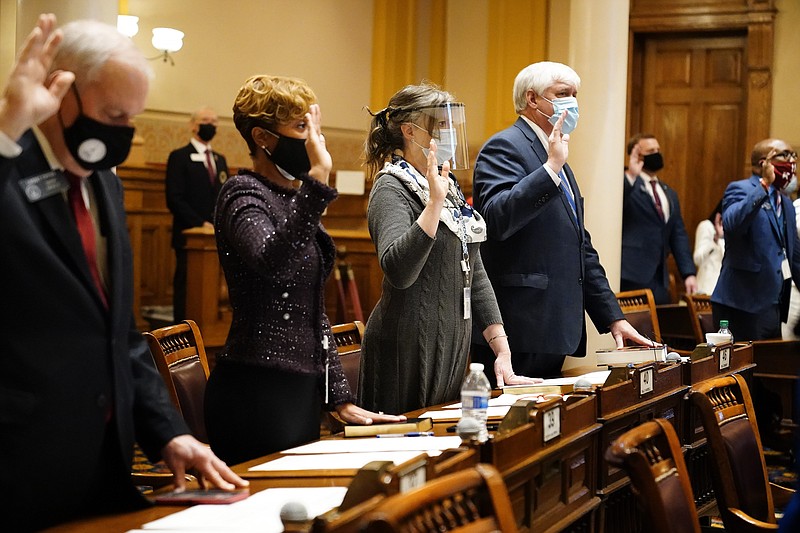ATLANTA (AP) - A state police SWAT team patrolled Georgia's Capitol on Monday as lawmakers gathered for the first time since rioters stormed the U.S. Capitol in Washington and threatened to take their grievances to statehouses around the country.
The legislators may feel less secure under Georgia's gold dome than normal, and not just because coronavirus infections are soaring. Gov. Brian Kemp and other state officials have been under withering pressure from President Donald Trump and a group of GOP state lawmakers who have questioned the legitimacy of President-elect Joe Biden's victory.
Democrats decried Republican support for overturning the presidential election as the House and Senate met Monday to swear in members to two-year terms.
"There has been real damage done to our country, to our state and to this legislative body," said Sen. Elena Parent, an Atlanta Democrat, who said she has gotten death threats since she disputed claims at a Senate hearing last month.
Republicans kept their majorities in both chambers despite the political earthquake of Biden winning Georgia's presidential vote and the aftershocks of Democrats Raphael Warnock and Jon Ossoff winning U.S. Senate runoffs by even larger margins. And many Republican voters, told repeatedly that only fraud could explain their party's defeats, are counting on their state lawmakers to crack down.
Republican statewide officials have largely stood behind the election results, with Kemp supported by Lt. Gov. Geoff Duncan and House Speaker David Ralston, who was reelected to his leadership post on a 158-11 vote.
But they are still signaling interest in tightening voting rules as Democrats gain power in Georgia, amid intense pressure from Republican constituents who believe the baseless attacks on Biden's win. Ralston has said he'll form a special committee to review potential changes to election laws.
"Our elections must be fair, free from fraud, secure and accessible," Ralston told House members. "That is our obligation. But equal to that obligation is this one: we must always tell our citizens the truth."
Ralston's statement was a contrast to the misinformation from the Trump campaign that dominated recent election hearings in the House and Senate. It came as both Republican and Democratic members made pleas for unity and cooperation, statements typically easier to make on the first day of a session, before hard votes on divisive bills.
Guests were limited in the House and banned in the Senate during the 40-day session's ceremonial opening, a day that usually features grandchildren wriggling on laps. Due to pandemic protocols, all 180 House members were sworn in not at once, but rather in four socially distanced waves.
Senators for the first time are required to wear masks, said Sen. Butch Miller, of Gainesville, the GOP nominee for Senate president pro tem. Masks were optional in the 56-member Senate during the tail end of last year's sessions and during committee hearings since, even though multiple senators were sickened with the respiratory illness. Masks were mandated in the House last year.
Both chambers are requiring members and staff to take twice-weekly saliva tests to try to slow the spread of the virus. And they've also banned legislative pages as well as the usual processions of beauty queens and 4-H members who are normally honored at the legislature.
Other business is supposed to proceed semi-normally, although Ralston said that could change if illness runs rampant. Lawmakers took a break from March until June last year when the coronavirus first began spreading in Georgia.
"I think it's just going to be a decision that's going to be made quickly," Ralston told reporters Thursday. "We may have to make decisions kind of on the fly if the (infection) rate spikes here."
House members are still spread between the House floor, what's normally the visitor's gallery, and a committee room, although the House bought an electronic voting system that's supposed to avoid the oral roll calls that dragged House business to a crawl last June.
Monday saw both chambers affirm leaders that the majority Republican caucuses agreed to in November. They are also passing rules, with some tweaks from usual because of the virus. Some veteran lobbyists said they plan to stay away as much as possible, although that could change as the session rises to its midpoint crescendo - crossover day - when a bill must advance to the opposite chamber, and at the end, when leaders can rewrite bills on the fly, resurrecting proposals that had appeared dead.
Kemp will give a socially distant State of the State address and release his budget on Thursday. The House and Senate plan joint budget hearings for the following week, when the full chambers are unlikely to meet.
